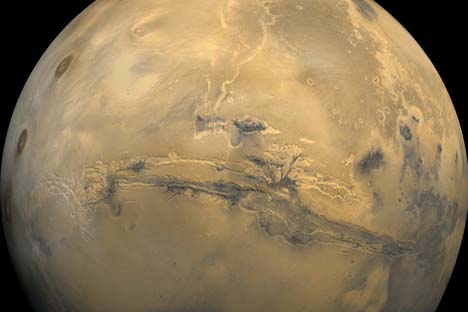Russian Space Programme sets sights on the Moon

'The Moon is naturally our immediate objective in space. It is essentially a space continent of the Earth. I believe its development will start in the 21st century.' Source: Nasa
Russkiy Reporter: Space industry bosses have recently reported that Russia will explore the Moon on site. This was announced first by the head of the Russian Federal Space Agency (Roscosmos), Vladimir Popovkin, and then by the deputy prime minister, Dmitry Rogozin. Are space specialists seriously discussing lunar bases?
The Moon is naturally our immediate objective in space. It is essentially a space continent of the Earth. I believe its development will start in the 21st century. There will be lunar bases just the way we have bases in Antarctica.
We used to have two rovers on the moon and we brought back soil from there. The knowledge gained in Soviet times has not been lost, and we are capable of doing all the things our predecessors did.
Russkiy Reporter: So far, the Russian programme has only two moon-related projects: Luna-Glob and Luna-Resurs (Chandrayaan-2). What is their progress?
The projects were revised early this year following investigations into the Phobos-Grunt crash. We have learned our lesson. We recently completed testing the engineering models of equipment for our landers and will soon start integrated tests.
Luna-Glob is expected to land on the moon in 2015. The orbit will be explored in 2016 and the heavier orbiter Luna-Resurs is scheduled to land near the southern pole of the moon in 2017. We are developing a workhorse to study and explore the Moon. Soil will be delivered from the pole to compare it with the samples that were brought from the middle latitudes in the last century.
We are examining the feasibility of taking the soil from a depth of about two metres without losing volatile substances. We may even find water there.
Russkiy Reporter: There is the Moon Test Ground project, a robotic deployed base, at the Lavochkin Research and Production Association. Is this still being discussed as your next step?
I took part in the discussions on that project. It is our plan for the future… I learned a great deal from the way Korolyov, the great Soviet rocket engineer and spacecraft designer, used to work. He turned every project into a step towards the next one. The concept of the test ground is something that we need to strive for whilst working on the current projects. Here is an example: the orbiter to be launched in 2015 will have a beacon that will keep operating after the orbiter itself ceases its work.
When we choose sites for landing, we also look at whether they can be used in the future for infrastructure deployment. These radio beacons are the first contributions to that infrastructure. If the landing area proves interesting, then a heavier rover will be delivered there to take soil samples.
They will be followed by robots that will provide a power supply. If we see a chance for water production, we will deliver machines to produce water and convert it into oxygen and hydrogen.
Russkiy Reporter: Wouldn’t it be wiser to invest in the development of cheaper launch vehicles and then think about lunar bases?
I’m doing my best to fight the stereotypes that the project is expensive. Of course, we have to develop the programme based on costs. There is no need for a moon race, the kind that we had back in the 1960s, when several machines were launched one after another, as if from a machine gun. We need to remember that the first projects I’m talking about cost about 10 billion roubles. When we speak about ambition, this is small change. We also need to remember that this money doesn’t fly to the moon, but stays here as infrastructure, jobs and new materials.
People have forgotten that the Internet was a result of the Apollo program. The technology emerged naturally to serve that programme. No one seems to need the moon now, but, by the end of the century, it is possible that everyone will want a presence there. It happened to the Arctic and it is happening now to the Antarctic.
Russkiy Reporter: If we are being realistic, which country will be the first to have a man on the Moon in the 21st century?
It’s a matter of the world outlook. I believe it would be right if the station on the southern pole of the moon became the next international project after the ISS. Then it won’t matter who will be the first to step on the Moon.
First published in Russian in Russky Reporter magazine.
All rights reserved by Rossiyskaya Gazeta.
Subscribe
to our newsletter!
Get the week's best stories straight to your inbox